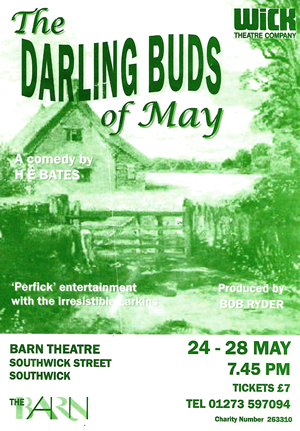The play is a wonderfully warm-hearted adaptation, by H E bates himself, of the novel that started the whole series of Darling Buds stories. It is charming, enjoyable stuff, which should leave audiences with a warm glow.
Review #1: The Darling Buds of May
Publication: Shoreham Herald
Publication Data: June 2 2005 – Scene Section – page 5
Reviewer: Maria Abrams
Text Header: The ‘perfick’ play
Text: Content
The Darling Buds of May is probably best known as a television series responsible for launching the career of a young Catherine Zeta Jones, a journey that took her all the way to Hollywood. A stage adaptation of the book, written by H E Bates in 1957, was presented this week at The Barn Theatre, Southwick by the equally impressive Wick Theatre Company.
The play follows a month in the life of the irrepressible Larkin family and has an undoubted ‘feel good’ factor. Pop wheels and deals to provide for his family (and it seems most of the local community!), Ma ensures all are well fed, whilst Mariette entertains visitors with trips to the Bluebell Wood to hear the nightingales sing. The play begins with the discovery that Mariette may be pregnant and ends with her engagement to Cedric Charlton, a civil servant who foolhardily attempts to get to the bottom of Pop’s financial affairs. In between we are treated to hilarious scenes as Mr. Charlton is seduced by the Larkin way of life, which appears totally fuelled by food, alcohol and sex. In the central role of Pop, John Garland was outstanding. He was at the hub of every scene, orchestrating the action, and managed to keep the perfect balance between the dodgy dealing and the genuine love for his family, friends and the countryside. The key to his portrayal was the cleverness with which he slowed his normal frenetic pace whenever he was contemplating the joys of life. Sharon Watts (Ma Larkin) provided the stability for the family and is equally praise-worthy for her portrayal of the Earth Mother ensuring the well being of her offspring. Her concern for poor Mr. Charlton, and her willingness to take him to her ample bosom, was delightful. Comic timing is key and Adrian Kenward was ideal as Mr. Charlton. What really impressed me was his use of mannerisms and other physical acting skills. His transformation from shy, retiring clerk to confident fiancé was great and I felt the scenes in which he gradually becomes more intoxicated were highlights of the show.
Lauren Gould certainly looked the part of Mariette, and I was pleased that she decided to play the role with a girlish naivety, rather than becoming overtly sexual. However, when she had to fight for her man she literally did, showing a whole different side to the character. This was helped by a wonderful cameo performance from Amy Curtis as Pauline. The rest of the cast were also excellent, and special mention should be made of Barbara Thomas (Edith) who stole the show in her courtship scene with Pop. The company also took the opportunity to blood a few members of their youth section with Rhiannon Whelan and Jessica Groves particularly noteworthy as the twins.
The set was dressed with real foliage and hay bales and the sound and lighting effects added to the atmosphere beautifully. I felt the split set caused a few problems with blocking and on one occasion I could hardly see an actor through an entire scene, but this did at least avoid lengthy scene changes that could have adversely affected the flow. Clearly the audience enjoyed themselves.
The quality of this production was superb as one has come to expect from The Wick, which must be considered one of the strongest amateur companies in the county. Congratulations to all involved both on and off stage under the capable guidance of directors Bob Ryder and Mark Best. It was perfick!
Review #2: The Darling Buds of May
Publication: Words & Music
Publication Data: Unknown
Reviewer: Gordon Bull
Text: Content
H E Bates’ creation of the shambolic and amoral world of the Larkin family has brought delight to both readers of his books and to viewers of the television adaptations. That delight has now spread to the audiences at Southwick where a revival of the author’s play was recently presented. This world was re-created to good effect in the current production. John Garland’s Pop was a down-to-earth provider for his family, showing genuine bewilderment when Mr. Charlton, the tax official, tries to drag him back to reality. One sensed that as a wheeler dealer he would be benign and fair in his dealings, as opposed to the “Del Boy” antics of his TV counterpart.
As Ma Larkin, Sharon Watts was delightful and appeared to have stepped straight out of the pages of the book. She was the personification of the author’s creation – large, jovial and shaking like a jelly when she laughed. A true Mother Earth figure – enfolding all and sundry in her large bosom and constantly wanting to provide them with food. Adrian Kenward displayed wonderful comic talent as the hapless Mr. Charlton especially after partaking of a couple of Pop’s special cocktails. He is the object of romantic pursuit by Mariette, the Larkin’s eldest daughter, and Lauren Gould captured both the girlishness and the sexuality of the character.
The rest of the cast provided excellent support, led with the performance by Barbara Thomas as Edith Pilchester. Her portrayal of the love-starved spinster, ever grateful for the affection shown by Pop, was superb. She fully realised the comic potential of the part. There were fine cameos from Derek Fraser as the retired Brigadier living in reduced circumstances, Ralph Dawes as Sir George, and Rosemary Bouchy, taking time off from her Publicity duties, to turn in an amusing performance as Lady Bluff-Gore.
Nick Richmond was suitably bemused and bewildered as Charlton’s boss, whilst Amy Curtis impressed with her realistic cat fight with Mariette. The fun-loving Angela Snow, whose arrival towards the end of the play was as lively and as crackling as the fireworks that she lit, was Nikki Dunsford. Another portrayal that stepped straight out of the pages of the book.
And a word of praise for the four youngsters who played the rest of Larkin children for their concentration and for remaining in character during the times when the action did not involve them.
Review #3: The Darling Buds of May
Publication: Words & Music
Publication Data: No. 117 – July / August 2005 issue – pages 4 & 5
Reviewer: Barrie Jerram
Text Header: A most enjoyable production
Text: Content
H E Bates’ creation of the shambolic and amoral world of the Larkin family has brought delight to both readers of his books and to viewers of the television adaptations. That delight has now spread to the audiences at Southwick where a revival of the author’s play was recently presented.
Written and set in the late 1950’s it no doubt raised a few eyebrows by expressing the liberal views of the Larkin family and their lifestyle that disregarded the rules and conventions of that time. It would have seemed shocking to glamourise a situation where a couple were living together, not only unmarried, but having five children – shocking then but par for the course in modern Britain. The stories anticipate the coming in of the social revolution of the 1960’s.
Moreover the Larkin tales are set in the post-war years when England was still recovering from an era of austerity that is counter-pointed by the family’s excessive eating habits. They also evoke an era long past that is often looked back on with nostalgia – it’s John Major’s world of cricket on the village green and warm beer. In creating Pop Larkin, Bates finds a voice for his own feeling to be expressed. They are both passionate about Nature and have a deep love for the sights and sounds of the English country-side.
This world was re-created to good effect in the current production. John Garland’s Pop was a down to earth provider for his family and whose self sufficiency has removed him, as it were, from the outside world. Hence his genuine bewilderment when Mr. Charlton, the tax official, tries to drag him back to reality.
As Ma Larkin, Sharon Watts was delightful. A true Mother Earth figure – enfolding all and sundry in her large bosom and constantly wanting to provide them with food. Adrian Kenward displayed wonderful comic talent as the hapless Mr. Charlton especially after partaking of a couple of Pop’s special cocktails. He is the object of romantic pursuit by Mariette, the Larkin’s eldest daughter, and whilst Lauren Gould captured both the girlishness and the sexuality of the character she lacked vocal projection. Sadly there were many occasions when she was inaudible.
The rest of the cast provided excellent support, led with the performance by Barbara Thomas as Edith Pilchester deserving of special mention. Her portrayal of the love-starved spinster, ever grateful for the affection shown by Pop, was superb. She fully realised the comic potential of the part.
An attractive split set provided the interior of the house and the garden but provided problems of staging. The respective cramped acting areas meant the players were often masked. There was one feature of this most enjoyable production that I would take issue with and that is the size of the glasses for drinks. The Larkins do everything to excess and their spirits and cocktails should have been served by the half pint and not in thimble sized glasses!
[/showhide]





